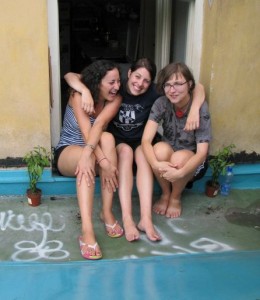
THE CROSSING BLOG
Everyday Missionaries
Are you a missionary? I am. I’m not always a faithful missionary. I’m not always an effective missionary. But I am a missionary… and so are you. All who follow Christ are given the mission to make disciples as we go along the road of life. Some are sent overseas. Some are sent to unreached places. Some are freed up to do this vocationally. But we’re all sent into the world together as communities of missionaries (John 20:21).
We talk about this often with our church. We try to help everyone embrace their identity as a missionary and a vital member of a missionary community (Life Group). For some, this can seem overwhelming, so I want to offer a few practical ideas that can help us approach everyday life as everyday missionaries.
Be regulars
We’ve seen people become a part of our community through relationships built at stores, gyms, restaurants, bars, coffee shops, parks, hospitals and grocery stores. These relationships rarely develop through a single encounter. They grow over time and with regular interactions. Go to the same places for your regular routines. Go to the same coffee shop regularly and build a relationship with the baristas. Go to the same gym at the same time each week and build relationships. Go to the same library at the same story-time session weekly with your kids, and become a part of that community. Shop at the same grocery store at a regular time and go to the same check out each time. Be intentional about visiting the same places for your weekly activities. Get to know the people, remember their names, ask about their kids and their weeks and follow up next time you see them. Before long, you’ll find out that you’re becoming friends.
Build friendships
New friendships require time together — whether it is with your neighbors, coworkers or other people you have met along the road. Eat meals together, go to parks together, watch sporting games together, do hobbies together — just do something together that allows you to share your life, listen, learn and love. In our culture, people will recognize an agenda-driven, salesman approach to friendship. We must actually love people — whether or not they ever come to believe. When you are genuinely friends with someone, they will trust you and listen to your perspective more readily, and they will more readily share their true reasons for not yet believing.
“Show & Tell” the grace of God
As friendships grow, we must model honesty about our own brokenness. Most people imagine Christians to be either clean and put together or hypocrites, so they feel the need to pretend like they have it together. This proclivity to maintain a façade of righteousness hinders us from proclaiming and celebrating the grace of God. Because of God’s grace in Christ, we can be real about who we are — our struggles, our trials, our failures and our joys. We don’t want to boast in our sin, but we do want to be honest about it so that we can boast in the Cross where we have received grace. As friends begin to let us into their lives, we must show God’s grace to them as we accept them, and we must be bold to share with them the good news of God’s grace in Christ.
Invite friends into your community
Introducing unbelievers to your community of believing friends is one of the most neglected, yet important aspects of introducing people to Jesus. Practically, this is the same as building friendships, but it requires finding ways to build friendships with unbelieving friends and believing friends simultaneously. When people see your individual life and your love, they see one good person. When they meet your believing friends, they will (hopefully) meet a community of grace, a community of honest and broken people, a community of servants and a community that loves God’s truth. They will meet the Body of Christ. Your community displays God to the world because God is in you (i.e. y’all). When broken people are accepted by God’s people, they begin to understand that God will accept them too, because of Jesus. Often people come into a real relationship with God after first coming into a meaningful relationship with His people.
Pray like missionaries
If we are God’s missionaries, then we must pray like missionaries. We must pray for opportunities for ourselves and for one another. We must pray for readiness. We must pray for Spirit-filled love. We must pray for patience. We must pray for wisdom. We must pray for awakening. Unless God graciously acts, we will never see people come to new life in Christ. So, above all, we must pray for God to awaken our friends to the light of the Gospel of Jesus Christ.
Kingdom Living - Becoming Family
By God’s grace, The Crossing family has been growing, and our Life Groups have been multiplying. Our Life Groups are more than Bible Studies or weekly meetings. They are growing families, committed to living for Jesus and His mission together. The following video shares a story of what God has been doing in one of our newer Life Groups in Loveland, and how this burgeoning family is being used to shine God’s glory to our community. Praise God for His faithful love.
Like a Liver or a Big Toe
From Porterbrook:
Remember that the church is neither an end in itself, nor is it merely a means to an end…Church is a place where Jesus reigns and where people will catch a glimpse of people loving and serving one another. Church is God’s Kingdom with flesh on it. It is a glorious phenomenon.
The Crossing is a church plant, and one of the greatest personal benefits that I have received from being part of this church plant has been a greater understanding of what church actually is. That’s not to say that my previous church experience was devoid of this, but this reality has come into sharper focus as I’ve matured alongside this growing body.
In so doing, though, it has become rather easy to think of building the church as an end in itself. And when I notice myself thinking in this way, the pendulum swings (as pendulums often do) to the other side, which is isolation.
I regularly find myself way too focused on how to gather more people by meeting with them, inviting them to my Life Group, or to a Sunday gathering, or to any other church community related activity. This happens until I notice my ability to simply sit and adore Jesus has become severely diminished. The response to that is often frustration at my busy schedule (and the people who fill it) and a tendency to seclude myself from others so that I can have those personal quiet times in devotion. This usually continues until I notice that I’ve been so isolated from community that I get frustrated with myself yet again, and the cycle starts over.
Neither of these extremes is healthy, and I propose trying to strike a balance is not the answer.
Rather, what I think is right is for us to put Christian community in its proper context. Simply, church is the expression of God’s people as they come together to live in a community that models what reconciliation with God looks like by living with each other in a reconciled way. This means we can forgive each other (Ephesians 4:32), serve one another (Philippians 2:3-4), pray with one another (1 Thessalonians 5:17), speak the word to each other (Colossians 3:16), eat with one another (Acts 2:42), etc.
The church is a spiritual community. Therefore in order to have our spiritual satisfaction, it’s helpful to understand that our spiritual life is not confined to personal devotion time, though not to the utter neglect of that time. But is it possible that Christian community can be utilized for our growth in godliness in a more healthy and significant way than we typically conceive?
So what does this mean for our church context?
Firstly, we need to fight against the idea that church is something that you attend. Instead, church is something that you participate in. Like the liver participates in digestion and detoxification, or a big toe participates in balance. I have no body parts that merely attend my body.
Secondly, I want us to become a community that worships and enjoys Jesus through and with one another. The emphasis of the New Testament is that the church is the context in which worship, personal growth, community growth, and mission take place. This is in stark contrast to the popular view that spirituality takes place in one’s own quiet room or in the isolation of the mountains.
Let us consider whether or not there is something we could learn here that not only benefits our own personal walks, but also influences and builds the community of God that is The Crossing in Fort Collins.
This is Discipleship
This is what we are all about: Making disciples of Jesus Christ for the glory of God and the joy of His people.
Something Amazing From Prague!
I just received an e-mail from a good friend and sister in Christ. Kara Swindler is currently on mission in the Czech Republic for the foreseeable future, and The Crossing is actively supporting Kara in her ministry to a very dark and atheistic nation. I praise God for what He is doing in the Czech through and for Kara and the people she is reaching. Here is her e-mail:
| An AMAZING event happened yesterday!
We had 4 of our students in our apartment, not for English club BUT for a BIBLE STUDY!!! Why is this so amazing? It was their first bible study for all 4 girls. Three of these girls, Cristina, Jane, and Bara, became Christians in the last year and the other girl, Šarka, is not a Christian but wanted to come. At the end of 4 hours of eating, laughing, and learning about God’s Word together – everyone asked where to start reading the bible? We all excitedly answered to meet weekly and study the gospel of John together. My 2 Czech roommates (also English teachers) Eliška, Zuzka, and I will be leading the bible study together. Please pray for God’s Words in John to reveal the glory of Christ to Cristina, Jane, Bara, Šarka as they venture forward. Also for God’s wisdom to be spoken through Eliška, Zuzka and I as we share the joy it is to know our God and Savior more and more! (see the picture of my roommates and I attached!) the LORD’s Kara Swindler |
She included this picture in her message:

For more information on Kara, check out her blog.
